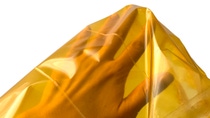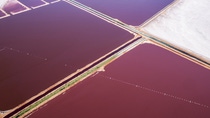Seaweed speculation: an algal bloom of ideas

With the COVID-19 pandemic sparking many DIY projects, life under the new restrictions is also making us rethink how we can live our lives more sustainably. The team at Science Gallery Melbourne think seaweed might just play a role in the answer. To explore this concept further, we recently sat down with Ryan Jefferies, Creative Director at Science Gallery Melbourne and artists in residence Lichen Kemp and Jessie French from Seaweed Appreciation Society international (SASi).
The team at Science Gallery are used to doing things a little differently. So, when the COVID-19 pandemic put their Melbourne Design Week public event ‘Seaweed Salon’ on hold back in March, they decided to adapt and provide a new virtual experience just in time for National Science Week which kicks off on Saturday, August 15.
Seaweed Salon is a two-part workshop series hosted by Science Gallery Melbourne and SASi, where guests will be invited to experience another world from the safety of their own home. “Seaweed Salon will be fascinating fieldtrip to a different world,” describes Lichen. “Complete with edible algae bioplastics and refreshing seaweed cocktail, the series will explore how seaweed could enable us to live our lives more sustainably.”
Having worked as artists-in-residence in various countries, Lichen and Jessie have a wide range of knowledge about seaweed and algae. In their quest to explore seaweed’s sustainability contributions further they created an edible bio-plastic film out of BASF’s natural beta-carotene – an algal Vitamin A derivative.

Cultivated in Australia’s picturesque pink lakes, BASF’s natural beta-carotene is a health ingredient applied in dietary supplements and used commonly in the food industry as a colorant. “It is been fantastic to brainstorm around this interesting ingredient and give it a new form of life,” added Ryan.
“The three key themes at Science Gallery in 2020 are: the culture in a time of crisis, people and plants - which is the inspiration and the concept behind Seaweed Salon,” Ryan continues.
Science Gallery aims to engage young people from the age of 15 to 25 by connecting the different and often separate fields of art and science, a vision SASi also shares.
“We want to help people challenge ourselves and get a new understanding of combining knowledge (science) and perception (art),” explained Jessie. “Science Gallery fosters such cross-dialogues charged by mutualism.”
Seaweed Salon will be held on Wednesday, 19 August 2020 from 6 - 7pm AST. For more information on the two-part series of experimental online workshops and details on how to stream the event online for free visit:
https://melbourne.sciencegallery.com/events/seaweed-salon-national-science-week-2020
BASF is a proud supporter of Science Gallery Melbourne’s Mediator program.